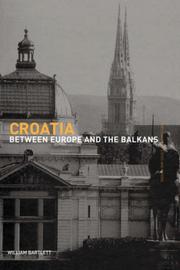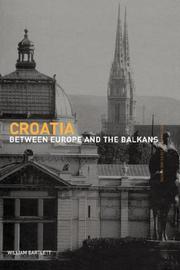| Listing 1 - 10 of 72 | << page >> |
Sort by
|

ISBN: 041527432X Year: 2003 Publisher: London ; New York : Routledge,
Abstract | Keywords | Export | Availability | Bookmark
 Loading...
Loading...Choose an application
- Reference Manager
- EndNote
- RefWorks (Direct export to RefWorks)
Croatia --- Croatie --- Social conditions. --- Politics and government --- Conditions sociales --- Politique et gouvernement --- CroatieSocial conditions.

ISBN: 1134478917 1280070250 0203642570 0415406595 9780203642573 9780415274326 041527432X 041527432X 9781134478910 9781134478866 1134478860 9781134478903 1134478909 9780415406598 9781280070259 Year: 2003 Publisher: London ; New York : Routledge,
Abstract | Keywords | Export | Availability | Bookmark
 Loading...
Loading...Choose an application
- Reference Manager
- EndNote
- RefWorks (Direct export to RefWorks)
Croatia, Between Europe and the Balkans addresses the key developments in economics, politics, international relations and social policy in the state over the last decade. It places these developments in their historical context, and shows how current policy dilemmas are structured within the conflicting pressures which historically have pulled Croatia between a European, a Mediterranean and a Balkan orientation. In the new context of European integration however, Croatia may now find a new role in her pivotal position as a bridge between the unruly Balkans and an impatient Europe. This book will be of particular use for courses on Eastern Europe. Its thorough, up-to-date analysis will also be of interest to students and researchers in politics and international relations, but with a broader appeal to diplomats, policy makers, trade officials, the business community and consultants expanding their trading links with the region.
Croatia --- Narodna Republika Hrvatska --- Socijalistička Republika Hrvatska --- SRH --- Hrvatska --- S.R.H. --- Kroatien --- SR Hrvatska --- SR Croatia --- People's Republic of Croatia --- Croazia --- Socialist Republic of Croatia --- NR Hrvatska --- Khorvatii︠a︡ --- קרואטיה --- Ḳroʼeṭyah --- Horvátország --- Repubblica di Croazia --- クロアチア --- Kuroachia --- クロアチア独立国 --- Kuroachia Dokuritsukoku --- Croatia (Republic : 1941-1945) --- Social conditions. --- Politics and government
Book
ISBN: 0136013945 Year: 1989 Publisher: Englewood Cliffs (N.J.) : Prentice-Hall,
Abstract | Keywords | Export | Availability | Bookmark
 Loading...
Loading...Choose an application
- Reference Manager
- EndNote
- RefWorks (Direct export to RefWorks)
Mortgage-backed securities --- Titres hypothécaires --- Titres hypothécaires
Book
ISBN: 3319936654 3319936646 Year: 2019 Publisher: Cham : Springer International Publishing : Imprint: Springer,
Abstract | Keywords | Export | Availability | Bookmark
 Loading...
Loading...Choose an application
- Reference Manager
- EndNote
- RefWorks (Direct export to RefWorks)
This book explores the economic and social development of the Western Balkan region, a group of six countries that are potential candidates for EU membership. It focuses on the key economic issues facing these countries, including the challenge of promoting economic growth, limiting public deficits and debt, and fostering international trade relations. Given the severe impact of the recent economic crisis on social welfare in the region, it also investigates the nature and extent of social exclusion, a factor likely to produce future political instabilities if not effectively addressed by a return to sustainable economic growth. The contributions explore these issues in light of the major influence of EU policy instruments and advice, which are currently guiding the economies along an accession trajectory to future EU membership. .
Europe—Economic conditions. --- Public finance. --- Public policy. --- European Economic Community lite. --- Development economics. --- Economics. --- European Economics. --- Public Economics. --- Public Policy. --- European Integration. --- Development Economics. --- Political Economy/Economic Systems. --- Economic theory --- Political economy --- Social sciences --- Economic man --- Economics --- Economic development --- Cameralistics --- Public finance --- Currency question --- European Economic Community literature. --- Economic policy. --- Economic nationalism --- Economic planning --- National planning --- State planning --- Planning --- National security --- Social policy --- Public finances --- Europe --- Economic conditions. --- Finance, Public.
Book
ISBN: 303106111X 3031061128 Year: 2022 Publisher: Cham : Springer International Publishing : Imprint: Palgrave Macmillan,
Abstract | Keywords | Export | Availability | Bookmark
 Loading...
Loading...Choose an application
- Reference Manager
- EndNote
- RefWorks (Direct export to RefWorks)
The countries in the Western Balkans have been severely affected by the wars and conflicts that led to the breakup of former Yugoslavia, by political instability and the effort of creating new states, weak economies and high levels of unemployment, poverty and social exclusion, and inequality. As revealed by recent surveys, such as EBRD’s Life in Transition Survey and Eurofound’s European Quality of Life Survey, life satisfaction in the region is far below that elsewhere in Europe. In recent years they had achieved a strong impetus of economic growth with falling rates of unemployment and increasing optimism for the future. However, the COVID-19 pandemic of 2020 has brought about a sudden reversal of these trends and a renewed deterioration in the economic outlook, and an increase in social hardships that heralds a repeat of past failures in economic inclusion policies. This book identifies the key challenges in the areas of economic inclusion, focusing on the themes of labour markets, vocational education and skills, female entrepreneurship and the integration of migrants. It considers the opportunities for solutions to “build back better” once the recovery from the COVID-19 crisis begins, and offers proposals for more acceptable, equitable and effective economic inclusion policies. William Bartlett is Deputy Director of the LSEE Research Unit of the European Institute at the London School of Economics and Political Science, UK. Milica Uvalić is Professor in Political Science at the University of Perugia, Italy.
Economic history. --- Economic conditions --- History, Economic --- Economics --- Europe --- Economic policy. --- Political planning. --- European Politics. --- Economic Policy. --- Public Policy. --- Politics and government. --- Economic nationalism --- Economic planning --- National planning --- State planning --- Planning --- National security --- Social policy --- Gay culture Europe --- Planning in politics --- Public policy --- Policy sciences --- Politics, Practical --- Public administration
Book
ISBN: 4064066187552 9700000039497 Year: 2019 Publisher: Good Press
Abstract | Keywords | Export | Availability | Bookmark
 Loading...
Loading...Choose an application
- Reference Manager
- EndNote
- RefWorks (Direct export to RefWorks)
Book
Year: 1942 Publisher: Durham : Duke University Press,
Abstract | Keywords | Export | Availability | Bookmark
 Loading...
Loading...Choose an application
- Reference Manager
- EndNote
- RefWorks (Direct export to RefWorks)
Book
Year: 1846 Publisher: Philadelphia (Pa.) Young
Abstract | Keywords | Export | Availability | Bookmark
 Loading...
Loading...Choose an application
- Reference Manager
- EndNote
- RefWorks (Direct export to RefWorks)
Book
Year: 1863 Publisher: London Nelson
Abstract | Keywords | Export | Availability | Bookmark
 Loading...
Loading...Choose an application
- Reference Manager
- EndNote
- RefWorks (Direct export to RefWorks)
Book
Publisher: London Virtue
Abstract | Keywords | Export | Availability | Bookmark
 Loading...
Loading...Choose an application
- Reference Manager
- EndNote
- RefWorks (Direct export to RefWorks)
| Listing 1 - 10 of 72 | << page >> |
Sort by
|

 Search
Search Feedback
Feedback About UniCat
About UniCat  Help
Help News
News